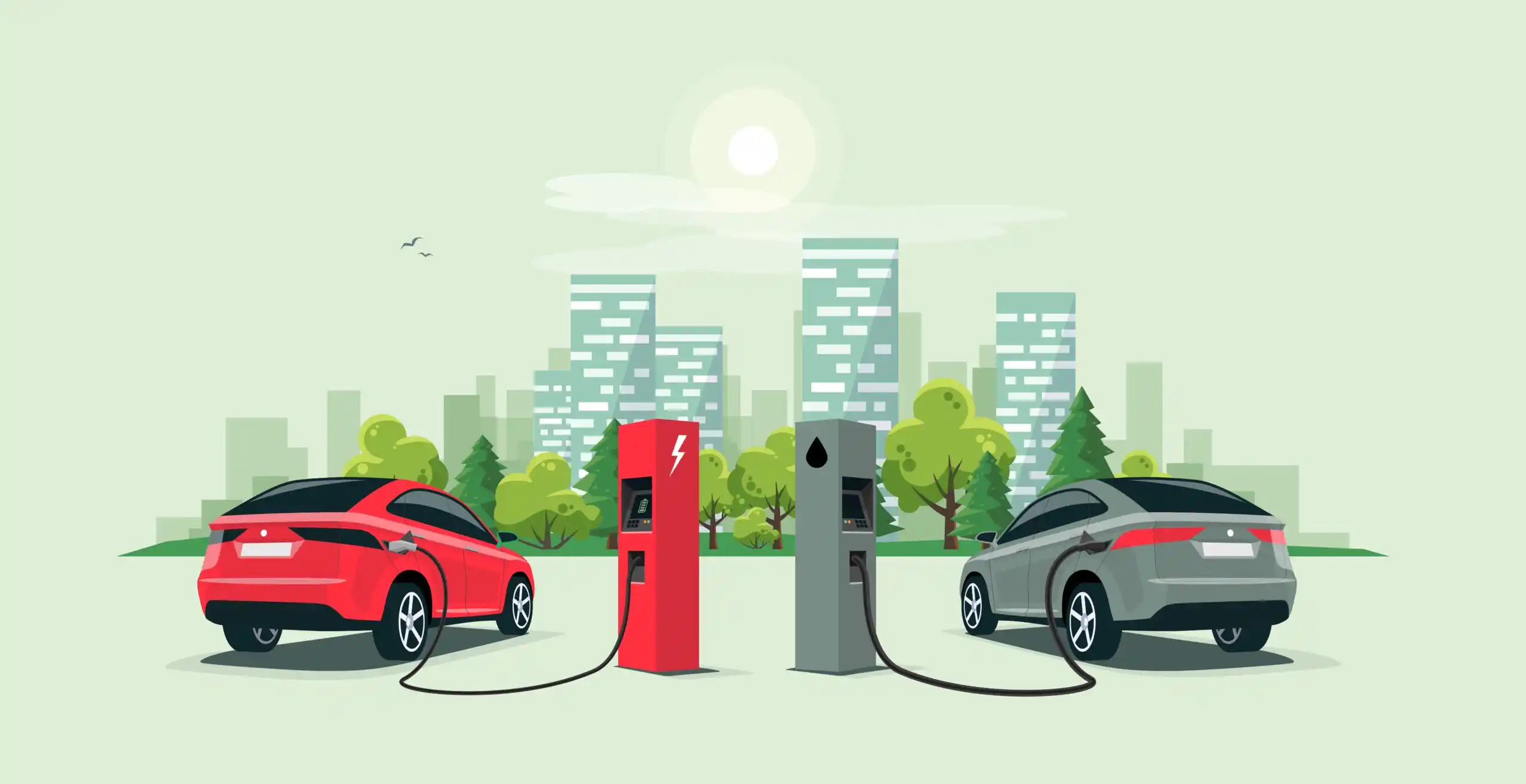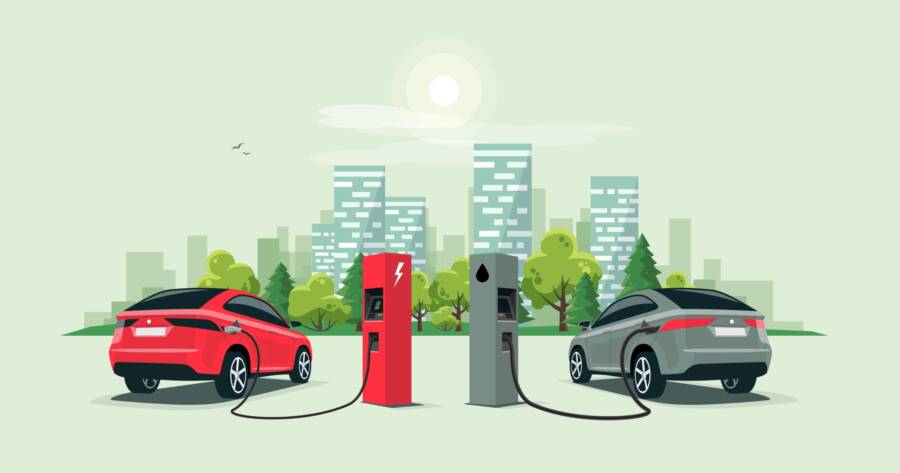There’s no doubt that the future of driving is electric. In fact, Morgan Stanley predicts that 72% of all car sales will be electric by the year 2040. Almost every major automaker has already invested billions of dollars into expanding their electric vehicle lineups. Within 20 years, it will probably be next to impossible to actually buy a brand new car that still runs on plain ol’ gasoline. Until that day comes, though, the debate between electric car vs gas costs rages on: which one will save you the most money overall?
As we dug into answering the question, we quickly discovered that it wasn’t easy. Most EVs still have higher-than-average starting prices, discouraging plenty of cost-conscious buyers. Then again, regular gas-powered cars don’t come with any tax credits. And then there are factors like auto insurance, general maintenance, and resale value to consider. Oh, and of course we had to weigh the costs of filling up the tank at the gas pump versus charging your EV — either at home or at public charging stations. Here’s how everything breaks down.
Purchase Price
Early adopters always pay the price. Although electric vehicles have already existed for more than a decade, they remain a niche product. Like any other emerging technology, they certainly aren’t cheap. The average price for a brand new EV is roughly $55,000. That’s considerably higher than the average four-door sedan, which runs about $35,000, according to Kelly Blue Book.
While you can start recouping that extra money with things like tax credits and gas savings, it’s going to take a few years to make up a potential $20,000 difference. Although EVs continue to get cheaper every year, on average, they still demand a larger financial commitment than gas-powered cars. If you have to buy a car out of state, for whatever reason, your costs could go up even higher.
That being said, that $55,000 average price is driven up by some of the higher-end EVs, like the Tesla Model S or Porsche Taycan. In fact, Tesla currently owns 79% of the EV market share! No wonder the average price is so high. However, it’s already possible to buy a Nissan Leaf, Kia Soul, or Chevy Bolt for less than $35,000.
Tax Credits
We can start with the easy part. There are no tax credits or other financial incentives available for buying a gas-powered car. You might be able to talk the dealership into throwing in a $100 gas gift card or some free oil changes, but that’s about it.
On the other hand, almost every jurisdiction offers some sort of tax credit for buying a “green” vehicle. Depending on which state you live in, you could be eligible for a federal tax credit between $2,500 and $7,500. You should know, though, that the tax credits are only good for EVs that are purchased (and not leased). They also only apply if you buy an EV brand new. So snagging a used Tesla isn’t going to cut it.
You can investigate your own potential tax credit right here.
Insurance
You might want to take the money you saved with tax credits and allocate them into your car insurance budget. On average, the cost to insure an electric vehicle is 23% more expensive than an equivalent combustion model. This is partly because the cars themselves are more expensive.
Since EVs are generally packed with the newest technology, they are a lot more expensive to repair or replace in the event of an accident or theft. As the infographic shows, you should expect to pay roughly $400-to-$500 more annually to insure your EV. No matter what kind of car you decide to buy next, make sure you aren’t caught driving without insurance. It will cost you.
Fuel and Charging Costs
For most people, these are the biggest questions they have concerning gas vehicles versus electric cars. Are electric cars really cheaper? How much will it cost to charge one? Are there enough charging stations? Will you need to install your own at-home charging equipment? We have the answers.
Let’s start with traditional gas cars. Depending on what you drive, your fuel costs will vary a lot. For example, a smaller sedan won’t guzzle gas like a larger SUV. However, taking all different models into consideration, the average American driver pays $1,117 per year in fuel costs. And that’s assuming there are no dramatic spikes in gas prices in the coming years. If you decide to stick with a non-EV, here are some handy tips on how to save money on gas.
On the other hand, it only costs an average of $485 annually to keep your electric car charged. Broken down even further, it only costs $6.86 to fully recharge your average EV battery. Compare that to $40 to fill the average gas tank. Additionally, the price of electricity historically drops over time. This happens as renewable energy costs keep falling. The growth of wind and solar power, for example, should see electricity costs continue to drop.
There are a few other things to consider, though. For starters, plenty of EV purchases require you to have your own charging equipment. Installing a charging station in your driveway or garage comes with a hefty one-time cost — up to $2,300, in some cases. Many EVs can be plugged into a normal household outlet, but your charging rate will be woefully slow. We’re talking about waiting days for a full battery, as opposed to mere hours.
If you don’t own your own home, that may pose a problem. Your landlord may not be willing to spend that money. And why would you spend your own money upgrading property you don’t own? On the other hand, if your lease includes utilities, that’s basically free charging (if it’s allowed). Consider trying to negotiate it into your next lease.
You can directly compare the costs of owning a gas-powered car with an electric on the Department of Energy’s eGallon tool.
Maintenance
Buying an electric car means things will look different when it comes to routine maintenance. A new EV doesn’t need oil changes, air filters, transmission fluid, or smog/emissions tests. Some parts do need regular replacing though, like brake pads. When the numbers are crunched, an electric car still costs much less to maintain over the years.
According to Consumer Reports, EV owners will save at least $300 a year on general maintenance costs. Other analysts are more generous, estimating that the savings could be as high as $800 annually.
One big factor of owning an electric car, however, is servicing the battery. Most EVs run on lithium-ion batteries, which are similar (but much larger) to the battery in your smartphone or laptop. You’re probably aware that these types of batteries degrade over time. If you plan to own your EV for more than 15 years, you may need to budget for an eventual battery replacement. It will be a multi-thousand dollar bill, depending on your make and model. For example, a new battery for a Tesla Model 3 can cost up to $16,000 to replace. The good news is that federal regulations require that an EV’s battery pack be covered under warranty for at least eight years or 100,000 miles. That will protect you against this expense for a while.
Longevity
When we say longevity, we actually mean a few different things. For starters, we’re talking about how long the average car buyer keeps a new vehicle. In the U.S., it’s about six years. Looking back up at our infographic, you can see that we added up the estimated annual costs and multiplied them by six. The results? Your average EV will cost you $3,295 per year, compared to the $3,944 of a gas-powered car. When you factor in the higher average EV purchase price though, gas-powered cars actually have a lower six-year total cost. Then again, you can counteract that by NOT buying a $60,000 (or more) luxury EV.
Longevity can mean other things, too. For example, what kind of expenses will your car have if you plan to keep it longer? Over a long enough period of time, both kinds of vehicles will have expensive replacement or repair costs. It could be the transmission or other important engine components on a gas-powered car. An EV may eventually need a new battery or other expensive electronics replaced. In fact, the battery makes up 21% of the cost of a new EV. You don’t need to be a math expert to understand it would be an expensive replacement.
How Long is a ‘Lifetime’ of the Vehicle?
If you typically drive your cars for eight years or longer, you need to consider these “down-the-road” expenses. According to AARP, a typical gas car should last you about 200,000 miles. On the other hand, Tesla touts that their EVs should last at least 400,000 miles (and potentially as much as 600,000 miles).
A study from Consumer Reports found that opting for an EV will ultimately save you money over the lifetime of the vehicle. However, they defined a “lifetime” as 200,000 miles. That means you won’t actually reap those savings if you replace your vehicle every few years. On the other hand, if you tend to keep your new cars for six years or longer, buying an EV should see you spend less money in the long run.
Of course, this only works if you have comparable purchase prices. Comparing the longevity costs of a $30,000 gas powered sedan against a $50,000 EV is foolish. You’ll never make up the initial expense difference over the lifetime of your more expensive electric vehicle.
Climate Change
We mentioned at the start of this article that an all-electric driving future feels inevitable at this point. Indeed, the U.K. government has already pledged to eliminate the sales of new gas vehicles by 2030. Other governments are making similar laws. The state of California has also been particularly aggressive in the switch to electric. The Biden Administration in the U.S. recently promised to convert the federal government’s entire fleet into electric vehicles. All of these new laws are designed to help combat the growing threat of climate change.
Whether you’re personally concerned about climate change or not, it’s a reality that the entire planet is facing. Gasoline-powered cars continue to be a major source of pollution around the world. So does the extracting, refining, and use of fossil fuels that power those vehicles. Whether you’re trying to do your part to help or just getting ahead of the eventual legislative orders where you live, most of us will be driving an EV in the not-so-distant future. The only real question is when you will make the switch? And what will it cost you?
Other Factors
Like every other emerging technology, electric vehicles continue to get cheaper all the time. You no longer have to spend $100,000 on a fancy Tesla model to go green. There are plenty of cheaper alternatives out there. Even Tesla itself has promised to sell a fully-electric sedan with a $25,000 price tag by the end of 2023.
The growth of EVs can’t be denied. In 2015, only 580,000 EVs were sold worldwide. That number leaped up to 3.1 million by 2020. As the technology gets better and cheaper, more and more car buyers are leaning towards ditching their internal combustion engines for good.
However, there are two big factors that still keep prospective car buyers from making the switch. They are tied together. However, both overall driving range and available charging infrastructure remain a concern for potential EV owners. You can find a gas station on almost every other corner, but do you know where your closest public charging station is? Plenty of current EVs can travel well over 250 miles before they go dead. However, many drivers still fear they might end up with a dead EV battery somewhere on the side of the road. Range anxiety remains a very real thing.
The Bottom Line
The choice between buying a gas-powered car or an electric one is something that most of us will face over the next decade or two. Spending tens of thousands of dollars on any vehicle is a big decision for most people, so it’s worth digging deeper into the true overall cost of each vehicle. We hope our article has shed some light on these costs. No matter which kind of car you end up with, we have plenty of great tips on how to save money when buying a new car.
The extremely short answer is this: right now, an EV will probably cost you more money initially. That’s simply due to the higher purchase prices and the one-time cost of installing charging stations in your home. However, choosing electric will save you more money over time. The longer you own your vehicle, the more cost savings an EV will provide.
 Shutterstock
Shutterstock








